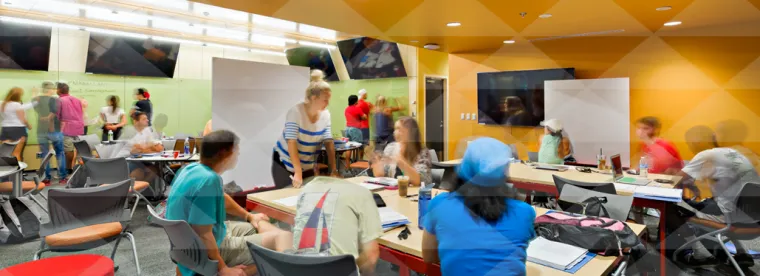When

CUES Mapping Educational Challenges (MECha) workshops explore challenges in university education by bringing together cross-disciplinary experts on the workshop theme.
About the Teaching & Learning Assistants in the Classroom MECha Workshop
This in person two-day workshop will bring together cross-disciplinary UArizona faculty to explore questions on the impact and value of undergraduate and graduate teaching/learning assistants (TAs/LAs)* who support teaching and learning across the disciplines. MECha Workshops set the stage for a CUES sponsored 100K collaborative grant on the previous MECha theme.
Participants will work collaboratively to map current practices, share experiences, and identify research directions to understand the impact and value of teaching and learning assistants in university education.
Topics include, but are not limited to:
- Roles teaching assistants play across disciplines
- Teaching assistants' impact as peers and near-peers
- Teaching assistants' strengths, including identity & achievement
- Enhancing teaching assistant capacity: Training and assessment
- Experiential and professional value of teaching assistantships
- Teaching assistants in active learning/authentic practice spaces
* For the purposes of this workshop, TAs/LAs include all types of student assistants in teaching and learning in UArizona classrooms.
Organizing Committee
Deb Hughes Hallett (chair): Professor, Mathematics, College of Science; Adjunct Professor of Public Policy, Harvard Kennedy School
Amy Graham: Associate Professor of Practice, Chemistry & Biochemistry, College of Science
James Hunt: Assistant Dean, Career and Academic Services; Associate Professor of Practice, Family Studies & Human Development, College of Agriculture & Life Sciences
Joela Jacobs: Assistant Professor, German Studies, College of Humanities

Workshop Results
MECha_TALA_Workshop_FullReport_Final.pdf
Workshop Reading Materials
Clements, T. P., et al. (2022). “It made me feel like a bigger part of the STEM community”: Incorporation of Learning Assistants Enhances Students’ Sense of Belonging in a Large Introductory Biology Course". CBE—Life Sciences Education, 21(2), ar26. Web. LINK
Margoniner, V., et al. (2020). "Learning-assistant-supported active-learning in a large classroom." American journal of physics, 88(11), 924-933. Web. LINK
Sellami, N., et al. (2017). "Implementation of a Learning Assistant Program Improves Student Performance on Higher-Order Assessments." CBE Life Sciences Education, 16(4). Web. LINK
Workshop Agenda
Fri., April 21 | 10am - 4pm
10:00-10:30 Registration and networking
10:30-11:00 Opening Session | Introduction and Workshop Charge
Question 1: What role do TAs/LAs play in your courses? How do you collaborate with each other? What is working well, and what isn’t?
11:00-11:30 Question 1 | Small Group Discussions
11:30-12:30 Question 1 | Whole Group Discussion
12:30-1:30 Lunch
Question 2: What are some key aspects of training LAs and/or TAs? What training would you like to see? What is working well, and what’s missing?
1:30-2:30 Question 2 | Small Group Discussions
2:30-3:00 Coffee break
3:00-4:00 Question 2 | Whole Group Discussion
Sat., April 22 | 9am - 4pm
9:00-9:30 Registration, breakfast, and networking
9:30-10:30 TA/LA Panel and Audience Q&A
Panelists:
- Lucy Garcia, Undergraduate Preceptor, Mathematics, College of Science
- Paul Krausse, PhD Candidate and Graduate Associate, Transcultural German Studies, College of Humanities
- Nekoye Masibili, Graduate Assistant, German Studies, College of Humanities
- Noah Rojas, Undergraduate Preceptor, General Chemistry, College of Science
Question 3: Based on what we’ve heard from the panel, what would make the TAs/LAs play the most productive role in your classes?
10:30-11:15 Question 3 | Small Group Discussions
11:15-12:00 Question 3 | Whole Group Discussion
12:00-1:00 Lunch
Question 4 | How do we gather information on, and assess, the impact of TAs/LAs in our courses? Do your TAs/LAs get evaluated? If so, how? How do we determine how the program is doing? Is it worthwhile to the TAs/LAs and students?
1:00-1:45 Question 4 | Small Group Discussions
1:45-2:30 Question 4 | Whole Group Discussion
2:30-3:00 Coffee break
3:00-4:00 Whole Group Discussion: Shaping Recommendations, and Next Steps

